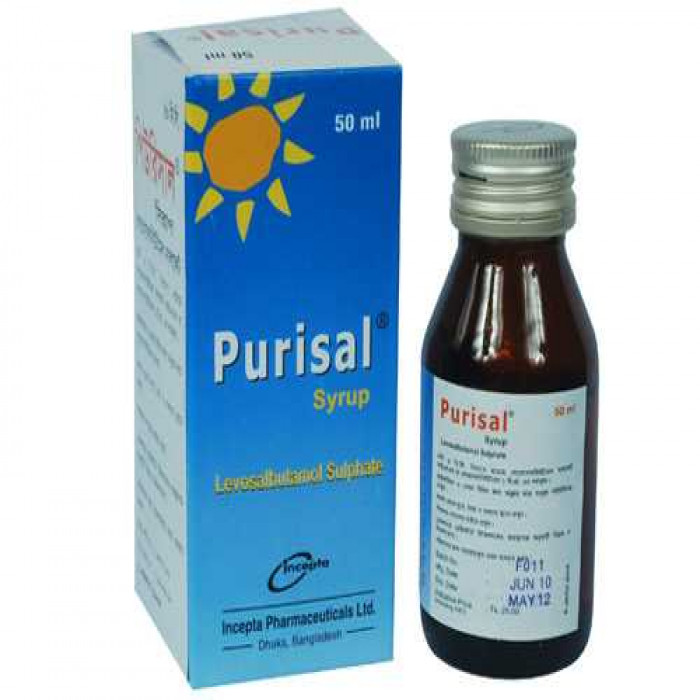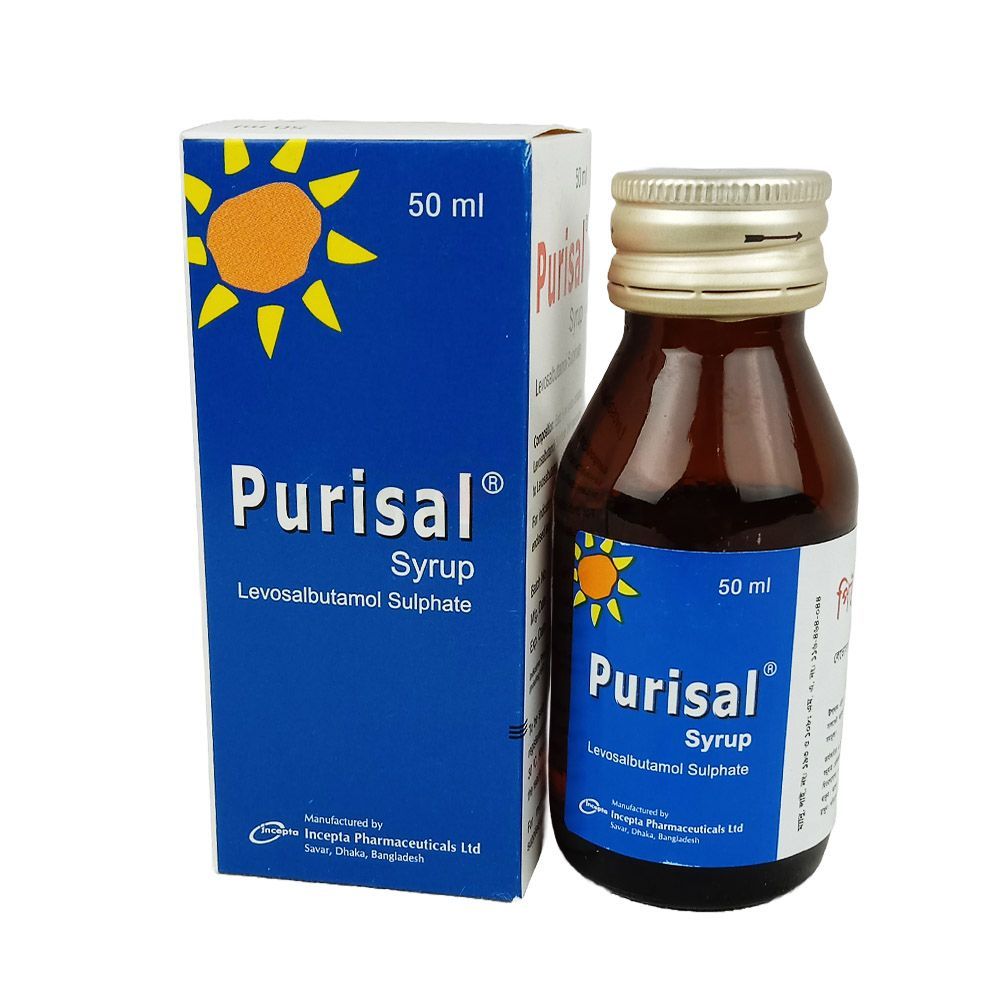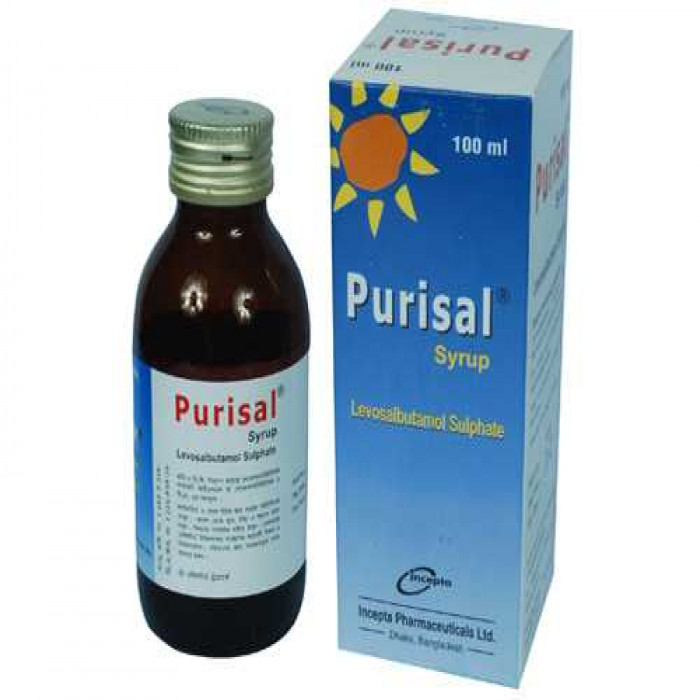
✔ 100% Authentic Product
👁️ Currently Viewing 3820
Purisal Syrup 50ml
Levosalbutamol (also called Levalbuterol) is used to relieve symptoms such as coughing, wheezing, difficulty in breathing, and chest tightness.
Discount
Price: ৳ 28
MRP:
৳
30
6%
Off

100% Genuine Products, Guaranteed

Safe & Secure Payments, Always

Fast, Secure & Efficient Delivery

Proper Packaging
 Cash on Delivery - All over Bangladesh
Cash on Delivery - All over Bangladesh Regular Delivery - 12-24 Hours, Dhaka City* Charge Tk.39-59
Regular Delivery - 12-24 Hours, Dhaka City* Charge Tk.39-59 Regular Delivery - 24-48 Hours, Other Cities* Charge Tk.99-110
Regular Delivery - 24-48 Hours, Other Cities* Charge Tk.99-110
 ফ্রি ডেলিভারিঃ - ৯৯৯ টাকা+ অর্ডারে, ঢাকা
শহরে
ফ্রি ডেলিভারিঃ - ৯৯৯ টাকা+ অর্ডারে, ঢাকা
শহরে ফ্রি ডেলিভারিঃ - ২৯৯৯ টাকা+ অর্ডারে, ঢাকার
বাহিরে
ফ্রি ডেলিভারিঃ - ২৯৯৯ টাকা+ অর্ডারে, ঢাকার
বাহিরে
100% Genuine Products, Guaranteed
Safe & Secure Payments, Always
Fast, Secure & Efficient Delivery
Proper Packaging
 Cash on Delivery - All over Bangladesh
Cash on Delivery - All over Bangladesh Regular Delivery - 12-24 Hours, Dhaka City* Charge Tk.39-59
Regular Delivery - 12-24 Hours, Dhaka City* Charge Tk.39-59 Regular Delivery - 24-48 Hours, Other Cities* Charge Tk.99-110
Regular Delivery - 24-48 Hours, Other Cities* Charge Tk.99-110 ফ্রি ডেলিভারিঃ - ৯৯৯ টাকা+ অর্ডারে, ঢাকা
শহরে
ফ্রি ডেলিভারিঃ - ৯৯৯ টাকা+ অর্ডারে, ঢাকা
শহরে ফ্রি ডেলিভারিঃ - ২৯৯৯ টাকা+ অর্ডারে, ঢাকার
বাহিরে
ফ্রি ডেলিভারিঃ - ২৯৯৯ টাকা+ অর্ডারে, ঢাকার
বাহিরে
✅ Description:
- Purisal Syrup contains Levosalbutamol, which is a bronchodilator used to treat or prevent bronchospasm in individuals with reversible obstructive airway disease. It is indicated for adults, adolescents, and children between 6-11 years old.
- Before starting treatment with Purisal Syrup, your doctor may request several diagnostic tests to assess your condition and determine the appropriate course of action.
- It is important to use Purisal Syrup with caution if you have certain medical conditions. These include cardiovascular disorders such as coronary insufficiency, cardiac arrhythmias, and high blood pressure, as well as kidney diseases, epilepsy, overactive thyroid gland, and diabetes. Inform your doctor about these conditions so that they can evaluate the potential risks and benefits of using the medication.
- Purisal Syrup is designed to relieve symptoms like coughing, wheezing, difficulty in breathing, and chest tightness by relaxing the muscles in the airways, thereby improving airflow to and from the lungs. It is available in various forms, including tablets, syrups, respules, rotacaps, transcaps, transhalers, transpules, and metered-dose inhalers. The specific form prescribed will depend on your individual needs and preferences.
- If you are pregnant, planning a pregnancy, or breastfeeding, it is important to inform your doctor before starting levosalbutamol. While safety data for Purisal Syrup in pregnant and breastfeeding women is limited, consulting with your doctor can help assess the potential risks and benefits in your particular situation.
- It is worth noting that the safety and effectiveness of Purisal Syrup have not been established in children below 6 years of age. If you experience any side effects while taking the medication, it is important to consult your doctor immediately.
Safety Advices

Alcohol
UNSAFE
There is limited information about the effects of Purisal Syrup with alcohol.

Pregnancy
UNSAFE
It is not advised to take Purisal Syrup during pregnancy until it is considered essential by the doctor and potential risks justify the benefits.

Breastfeeding
CONSULT YOUR DOCTOR
Purisal Syrup is not recommended for use in breastfeeding women as the effect on the nursing infant is not clinically established. Your doctor may ask you to discontinue breastfeeding if the use of this medicine is necessary.

Driving
CAUTION
Levosalbutamol may cause dizziness, thus you need to be cautious while driving.

Kidney
CAUTION
Purisal Syrup should be used with caution in patients with kidney disease. Consult your doctor before taking it.

Liver
CAUTION
Purisal Syrup should be used with caution in patients with liver diseases. Let your doctor know if you have any history of liver diseases or hepatic impairment. Your doctor will weigh the benefits and potential risks before prescribing Purisal Syrup.
✔️ Uses of Purisal Syrup
- Bronchospasm
- Chronic Obstructive Pulmonary Disease (COPD)
- Asthma
✔️ How does Purisal Syrup work?
Levosalbutamol is a bronchodilator. It works by relaxing the muscles in the airways and widens airways. This makes breathing easier.
✔️ Side Effects of Purisal Syrup
- Headache
- Viral infections
- Blocked or runny nose
- Sore throat and hoarseness
- Shaking and trembling of arms and feet
- Decreased appetite
- Muscle pain and cramps
- Anxiety and nervousness
- Swelling of eyelids, face, lips, tongue
- Nausea
- Skin rash and spotting
- Chest pain and discomfort
- Sleep disturbances
- Increased heartbeat
- Difficulty in swallowing
- Difficulty in speaking (dysphonia)
✔️ Quick Suggestions:
- Diet and exercise: Maintaining a healthy diet and regular exercise can help strengthen breathing muscles and boost the immune system.
- Avoid trigger foods: Certain foods like cabbage, beans, garlic, onions, shrimp, pickled food, dried fruits, fried foods, carbonated drinks, wine, and bottled lemon and lime juice may potentially worsen asthma symptoms. It is advisable to avoid these foods if they trigger your symptoms.
- Stress management: Practices such as meditation, deep breathing, regular exercise, and progressive muscle relaxation techniques can help relieve stress and reduce the risk of asthma attacks.
- Quit smoking: Quitting smoking is essential as it can reduce the effectiveness of medication like Levosalbutamol and irritate the lungs, worsening breathing problems.
- Managing dry mouth: Dry mouth may occur as a side effect of Levosalbutamol. To alleviate this, frequent mouth rinses, good oral hygiene, increased water intake, and sugarless candy may be helpful.
- Gargling with warm water: Gargling with warm water after each inhalation can help prevent fungal infections in the mouth and throat.
- Frequency of medication use: If you find yourself needing to use Levosalbutamol more than three times a week, it may indicate that your breathing problem is not well controlled. It is important to discuss this with your doctor.
- Inform your doctor: If you have a history of heart disease or experience symptoms such as heart racing, headache, or chest pain, it is important to inform your doctor.
- Breathing exercises: Learning and practicing breathing exercises can help improve lung function and increase air movement in and out of the lungs.
- Blood glucose monitoring: Bronchodilators like Levosalbutamol can raise blood sugar levels. If you have diabetes, it is important to monitor your blood glucose levels regularly.
- Heart condition monitoring: If you have a history of heart disease, it may be necessary to undergo an electrocardiogram (ECG) if you notice rapid heartbeat or blood pressure changes.
- Potassium levels: Monitoring potassium levels in the blood through a blood examination can help rule out the possibility of hypokalemia.
✔️ Indication
Fast-acting bronchodilators, also known as "relievers," are a class of medications that includes Purisal. It treats the coughing, wheezing, and shortness of breath that are signs of asthma and chronic obstructive pulmonary disease (COPD). Because Purisal inhalers provide prompt relief from breathing issues when you need them, they are known as "reliever" inhalers.
✔️ Pharmacology
Levosalbutamol, also known as levalbuterol, is a beta 2-agonist medication that specifically contains the active (R)-enantiomer of salbutamol, while excluding the (S)-enantiomer. This single isomer formulation of levosalbutamol distinguishes it from the racemic salbutamol, which consists of both the (R)- and (S)-enantiomers.
Levosalbutamol is considered an effective bronchodilator. The (S)-enantiomer, found in racemic salbutamol, does not contribute to the primary mode of action of levosalbutamol. By using only the (R)-enantiomer, equivalent bronchodilation can be achieved at lower dosages compared to racemic salbutamol. This can potentially reduce the occurrence of adverse effects mediated by beta receptors.
By focusing on the more pharmacologically active component, levosalbutamol aims to optimize the therapeutic benefits while minimizing unwanted side effects associated with beta-adrenergic stimulation.
✔️ Dosage & Administration of Purisal Syrup
The recommended dosage for Purisal Syrup can vary based on age and individual factors. The general recommended dosages for adults and children (6-11 years) are as follows:
- Adults: 5-10 ml of Purisal Syrup three times daily.
- Children (6-11 years): 5 ml of Purisal Syrup three times daily.
It is important to follow the dosing instructions provided by your physician or healthcare professional. They will determine the appropriate dose and duration of treatment based on factors such as your age, body weight, and the specific condition being treated. It is essential to shake the syrup well before use to ensure proper mixing of the medication.

✔️ Interaction
Purisal Syrup can potentially interact with several medications and may require caution in certain medical conditions. Here are the known drug interactions, food interactions, and disease interactions associated with this medication:
Drug-Drug Interactions:
- Antidepressants: There is a potential for interaction between Purisal Syrup and antidepressant medications. It is important to inform your doctor about all the antidepressants you are taking to assess the potential for any adverse effects or drug interactions.
- Heart-related medicines (Digoxin): Purisal Syrup may interact with heart medications such as Digoxin. It is essential to inform your doctor if you are taking Digoxin or any other heart-related medications to ensure appropriate monitoring and adjustment of dosages if needed.
- Anesthetics: There is a possibility of interactions between Purisal Syrup and certain anesthetic agents. If you are scheduled for any surgical or dental procedures, it is important to inform healthcare professionals about your use of Purisal Syrup.
- Water pills (diuretics): Diuretics, also known as water pills, may interact with Purisal Syrup. Your doctor will consider this interaction and monitor your condition closely if you are taking diuretic medications.
- Anti-hypertensive medications: Purisal Syrup may interact with medications used to treat high blood pressure (anti-hypertensives). Close monitoring and dosage adjustments may be necessary if you are taking these medications along with Purisal Syrup.
- Sympathomimetic agents (Epinephrine): Purisal Syrup and sympathomimetic agents, such as Epinephrine, may interact with each other. Your doctor will consider this interaction and adjust the treatment plan accordingly if necessary.
Drug-Food Interaction:
- Limit or avoid alcohol intake while using Purisal Syrup, as alcohol consumption can potentially worsen the side effects of the medication, such as increased sleepiness and shakiness.
Drug-Disease Interaction:
- Purisal Syrup should be used with caution in individuals with certain medical conditions. These include heart diseases, liver diseases, kidney diseases, hyperthyroidism (overactive thyroid), seizures (fits), high blood pressure, and diabetes. It is important to inform your doctor about these conditions before starting the medication, as dose adjustments or additional monitoring may be necessary.
Always inform your healthcare professional about all the medications you are taking, including prescription drugs, over-the-counter medications, herbal products, and dietary supplements. Additionally, disclose any medical conditions or diseases you have to ensure the safe and effective use of Purisal Syrup.
✔️ Contraindications
Patients having a history of hypersensitivity to levosalbutamol or any of its components should avoid using it.
✔️ Pregnancy & Lactation
Pregnancy: It is important to consider the potential risks and benefits before taking any medication during pregnancy. If the potential benefit of using Levosalbutamol outweighs the potential risk to the fetus, the medication may be considered for use under the guidance and supervision of a healthcare professional.
Breastfeeding: Levosalbutamol is not known to be eliminated in human milk. Therefore, caution should be exercised when administering oral Levosalbutamol to a breastfeeding woman. It is advisable to consult with a healthcare professional to assess the potential risks and benefits in the context of your specific situation.
✔️ Precautions & Warnings
- Heart, liver, or kidney diseases: Individuals with these conditions should inform their doctor before taking Purisal Syrup. Bronchodilators like Levosalbutamol can potentially cause hypokalemia (low potassium levels), which may lead to severe heart diseases. Caution should be exercised in such cases.
- Hyperthyroidism (overactive thyroid): If you have hyperthyroidism, it is important to inform your doctor before starting Purisal Syrup.
- Hypokalemia: Purisal Syrup may cause hypokalemia in some patients. Hypokalemia refers to low potassium levels in the blood, which can have adverse effects. Close monitoring is necessary, especially in individuals with pre-existing hypokalemia.
- Stomach ulcer: Individuals with stomach ulcers should inform their doctor before taking Purisal Syrup.
- Seizures (fits): If you have a history of seizures, it is important to inform your doctor before starting Purisal Syrup.
- High blood pressure: Individuals with high blood pressure should inform their doctor before taking Purisal Syrup. Close monitoring and possible dosage adjustments may be necessary.
- Diabetes: Purisal Syrup can cause a rise in blood glucose levels. If you have diabetes, it is important to monitor your blood glucose levels regularly and inform your doctor. They may need to adjust your diabetes medication or the dose of Purisal Syrup accordingly.
- Pregnancy and lactation: Inform your doctor if you are planning to conceive, are already pregnant, or are a lactating mother before starting Purisal Syrup. They will assess the potential risks and benefits and provide appropriate guidance.
- Driving and operating machinery: Purisal Syrup may cause dizziness and drowsiness. It is advisable to avoid driving or operating machinery until you know how the medication affects you.
- Alcohol consumption: It is recommended to avoid drinking alcohol while being treated with Purisal Syrup. Alcohol can worsen sleepiness and affect mental abilities.
- Not recommended for children below six years: Purisal Syrup is not recommended for children below six years of age.
✔️ Storage Conditions
Keep all medicines out of reach of children. Store in a cool and dry place, protected from light.
⚠️Disclaimer:
At ePharma, we’re committed to providing accurate and accessible health information. However, all content is intended for informational purposes only and should not replace medical advice from a qualified physician. Please consult your healthcare provider for personalized guidance. We aim to support, not substitute, the doctor-patient relationship.








